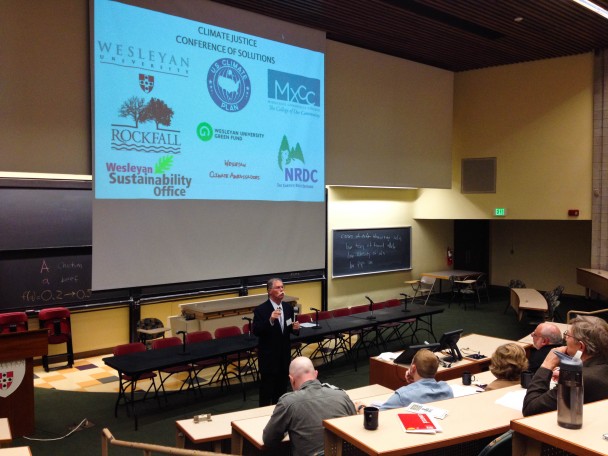On Saturday, April 12, the University hosted the U.S. Climate Plan’s Climate Justice Conference of Solutions. The event, which consisted of a series of panels, talks, and workshops led by environmentalists on local and national levels, focused on climate action, renewable energy, and independence from fossil fuels.
Scott Elias ’14, a Wesleyan Student Assembly (WSA) representative on the Sustainability, Facilities, and Finance Committee who helped organize the event, spoke to the reasoning behind the conference.
“The idea for this conference was inspired by a combination of taking…the course [CSLP 210:] Money and Social Change by Professor Joy L. Anderson and Hurricane Sandy decimating my hometown,” Elias said. “It was a lightbulb moment for me. Given what we’re facing we need to take action…. We have the ability to initiate these sorts of changes, to alter micro-systems, to reshape markets. And it’s a matter of, do we have mutually reinforcing activity, do we have collaboration, and how do we build coalitions?”
Uniquely, the conference, which ran all day from 8:30 a.m.-5:00 p.m., focused on climate change through a number of different perspectives, not just an environmental one. Among the event’s diverse speakers were President of 350.org Bill McKibben, Connecticut State Representative Matthew Lesser ’10, the Labor Director at the Sierra Club Dean Hubbard, Lieutenant Colonel Daniel L. Davis, and the keynote speaker, Executive Director of the BlueGreen Alliance David Foster.
Elias noted the importance of looking through these multiple perspectives.
“The climate crisis isn’t just an environmental problem: it’s a national security issue, it’s a social justice issue, it’s a business issue, [and] it’s an all of the above issue,” Elias said. “Looking at climate change through the lens of intersectionality, we can start to see that if we want to have the technical policy and strategic solutions that we need, then we have to look at these issues through these various paradigms…. So what we decided to do with this conference was to have the co-benefits of climate action coming from various perspectives—business, national security, policy, social justice [and] environmental labor.”
After panel discussions, audience members broke into different workshops. Wes, Divest!, a student group dedicated to ending the University’s investment in fossil fuels, led the workshop titled Derailing Divestment Myths. The workshop began with the group asking individuals where they stood on the spectrum of agreement in response to statements regarding fossil fuel companies, divestment, and the energy crisis. Moving from that exercise, the group dispelled myths about the inefficiency of divestment. Devil’s advocate and other oppositional arguments were frequently implemented to expand the discussion.
Wes, Divest! member Angus McLean ’16 commented on the discussion.
“I hope that people came away with a clearer picture about the realities of divestment and can now see why so many of the common arguments against it just don’t hold up,” McLean wrote in an email to The Argus.
Onté Johnson, who spoke on the local action panel, is a Beyond Coal organizer for the Sierra Club, which is dedicated to making Connecticut coal-free. Johnson discussed his campaign and the importance of getting University students and young people involved.
“The coal plant is located in Bridgeport, but this a coal-free Connecticut campaign,” Johnson said. “One of the things I’m always reminding people is: it’s not a coal-free Bridgeport, it’s a coal-free Connecticut. Everyone gets to benefit from that…. We need everybody on deck…. It makes so much sense to be working with college students, especially Wesleyan [students], because [of] Wes, Divest! and the fact that Wesleyan is so environmentally sound. I definitely would love to tap in and use the Wesleyan folks to help on this campaign.”
Tom Gaudioso, a Green Jobs Corps Coordinator at Common Ground High School who spoke on the panel, furthered Johnson’s emphasis on getting young people involved. When asked why high schoolers and college students aren’t greatly concerned about climate change, Gaudioso discussed the struggle of getting the youth interested.
“It’s hard to think about climate change when you don’t have the necessities [like] food, shelter, and a safe environment,” Gaudioso said. “So it is challenging, especially for young people of color, young people…of a lower economic scale to even think about that kind of thing when they’re worried about where they’re going to get their food next. That’s a huge challenge. You have to find out what their concerns are.”
Middlesex Community College Assistant Professor of Environmental Science Christine Witkowski was charged with the responsibility of wrapping up the day’s activities. In her speech, Witkowski turned the conversation over to the audience by asking individuals what they could do for the sake of climate justice. Individuality was a theme that pervaded the day’s discussion.
Elias commented on the significance of individuality in the face of climate change.
“I think individuality is important because we can talk about what society needs to do, but if everyone says society is going do it, who’s going to promote and who’s going to force society to do it?” Elias said. “An individual in itself can’t change everything, but just because you can’t change everything doesn’t mean you can’t change anything. That’s the attitude we need to adopt…. Slowly but surely as a society you can…deal with these extremely important and pressing problems.”
After a day full of fruitful discussion, approaching climate action from a variety of perspectives, Elias detailed his plan for the next step.
“I’m hopeful to move past the talk and start getting serious about action,” Elias said.
